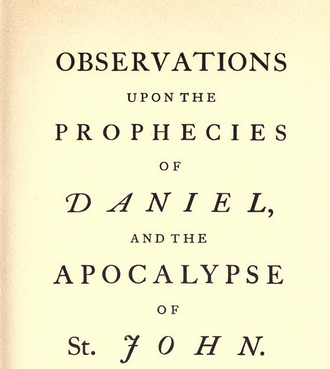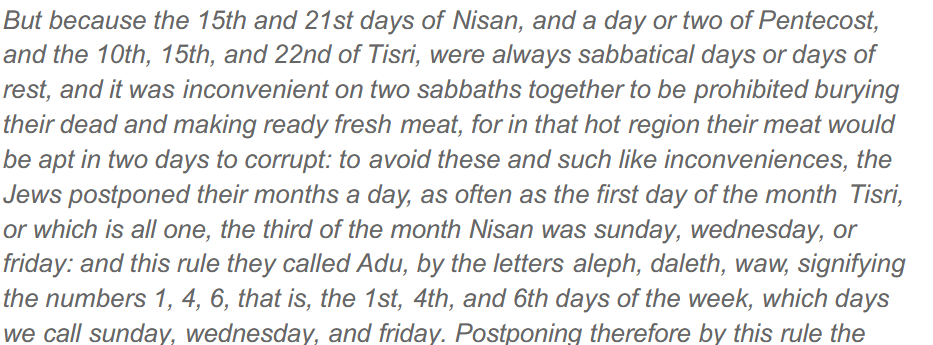
That Issac Newton was intellectually gifted, cannot be denied. He bestowed upon mankind many gifts, of which these are but a few.
- Newtonian Mechanics
- Universal gravitation
- Calculus
- Binomial series
- Optics branch of physics
https://en.wikipedia.org/wiki/Isaac_Newton
But his lesser-known works are what make him even more fascinating. His love for biblical prophecy and eschatology.
Among those works are his commentary on the book of Daniel and the Apocalypse.
 |
https://publicdomainreview.org/collection/sir-isaac-newton-s-daniel-and-the-apocalypse-1733 |
His acute attention to detail has pointed out that the 70 weeks of Daniel chapter 9 have been misinterpreted from the onset of a few centuries. Newton may be the only other commentator, besides a few other people that I could name on one hand, who does not merge the 62 and 7 weeks into one linear continuation of 69.
Though this article is not about Newton’s eschatology on Daniel. It is worth quoting here.
“Know also and understand, that from the going forth of the commandment to cause to return and to build Jerusalem, unto the Anointed the Prince, shall be seven weeks. The former part of the Prophecy related to the first coming of CHRIST, being dated to his coming as a Prophet; this being dated to his coming to be Prince or King, seems to relate to his second coming. There, the Prophet, was consummate, and the most holy anointed: here, he that was anointed comes to be Prince and to reign. For DANIEL’S Prophecies reach to the end of the world; and there is scarce a Prophecy in the Old Testament concerning CHRIST, which doth not in something or other relate to his second coming.
We avoid also the doing violence to the language of DANIEL, by taking the seven weeks and sixty-two weeks for one number. Had that been DANIEL’S meaning, he would have said sixty and nine weeks, and not seven weeks and sixty-two weeks, a way of [numbering] used by no nation.”
Date of the Lord’s Passion
Now as to his understanding of the date of the crucifixion of our Lord, the following information about Newton’s belief can be found and analyzed here.
https://www.scribd.com/document/491270988/johnpratt-com-Newtons-Date-For-The-Crucifixion
It is a lengthy and technical read so I will only summarize his thoughts and then respond with my own.
- Newton starts his dating when Christ was baptized and started his ministry in the year AD 29, the 15th year of Tiberius Ceasar’s reign as told by Luke 3:1,2.
- There were 5 Passovers during Christ’s ministry.
- Newton believed that Christ was crucified on a Friday. This greatly influenced his decision making when looking at the new moon years of 31 – 36 AD.
- Christ was crucified on the Day of the Passover when the lamb would have been offered.
- Newton calculated the days of the week that the 14th (passover) fell on as such.



I do not wish to illegitimize Newton’s contribution on this subject. I believe the answer was right in front of him and he did not see it. Like most of the Christian world he fell prey to men’s ideas and philosophies. A preconceived view that Christ died on a Friday is not taught by scripture. If one would only use a little logic, you would see that Christ had to have been taken down off the cross Wednesday before night fall.
Mat 12:40 For as Jonas was three days and three nights in the whale’s belly; so shall the Son of man be three days and three nights in the heart of the earth.
Joh 11:9 Jesus answered, Are there not twelve hours in the day? If any man walk in the day, he stumbleth not, because he seeth the light of this world.
Mar 16:9 Now when Jesus was risen early the first day of the week, he appeared first to Mary Magdalene, out of whom he had cast seven devils.
Three days and three nights of twelve hours equals seventy two hours. It is clear Jesus spent seventy two hours in the grave and rose early Sunday morning. Even our Lord, who has power over heaven and earth and all the laws at his disposal, did not try to compress those hours in two days starting Friday. We can know the time that he was taken off the cross by starting at the morning of the first day of the week, and counting backwards.
Mar 16:9 Now when Jesus was risen early the first day of the week, he appeared first to Mary Magdalene, out of whom he had cast seven devils.
[Side note] Remember that the Jewish day began with night; Gen 1:5. Whereas the Julean day begins at midnight and splits the night (literal night, as in no sun) between twelve hours of day, the Judean day begins with twelve hours of night (again, as in no sun), and ends with twelve hours of daylight. Once you understand this concept it will start to make more sense.
The only logical answer is that he gave up the ghost while on the cross on a Wednesday eve. For a more in-depth study of the Wednesday crucifixion please read here: What Day did Jesus die on (cloversites.com) The only disagreement I would have, with the author, is his conclusion that Jesus was crucified on the same day the lamb was sacrificed.
Another misunderstanding is the belief that Jesus died on the evening of the killing of the Passover. He ate the Passover with his disciples, washed their feet, and was betrayed on the 14th day of the first month.
Some argue that he ate the Passover the day before the ascribed time.
Mar 14:12 And the first day of unleavened bread, when they killed the passover, his disciples said unto him, Where wilt thou that we go and prepare that thou mayest eat the passover?
Luk 22:15 And he said unto them, With desire I have desired to eat this passover with you before I suffer:
We have a situation where either the Passover lamb is killed on the 15th, after the lamb is supposed to be killed, or this is an example where the whole 8 days are considered the days of unleavened bread, including the 14th day. It was the day that “they killed the passover”.
Some even argue that he ate the lamb early in the morning instead of the evening. The scripture states that they went out to the mount of olives, after the supper, in the evening.
Mar 14:27 And Jesus saith unto them, All ye shall be offended because of me this night: for it is written, I will smite the shepherd, and the sheep shall be scattered. (30) And Jesus saith unto him, Verily I say unto thee, That this day, even in this night, before the cock crow twice, thou shalt deny me thrice.
Regardless of whether he ate the lamb early or late does not change the fact that it was the following morning when he was led to Pilot. It was the 15th day that he was placed on the cross.
Mar 15:1 And straightway in the morning the chief priests held a consultation with the elders and scribes and the whole council, and bound Jesus, and carried him away, and delivered him to Pilate.
Both Matthew and Mark tell us that Jesus was led to Pilate in next morning of the Passover, but John gives us more.
Joh 18:28 Then led they Jesus from Caiaphas unto the hall of judgment: and it was early; and they themselves went not into the judgment hall, lest they should be defiled; but that they might eat the passover.
Someone may argue, “See, the pharisees hadn’t eaten the Passover lamb, so it must be the 14th still. Well John 18:28 doesn’t contradict Mark 14:12. It is up to us to resolve this “seemingly” contradiction. Three times we were told that the lamb was to be eaten in the evening and nothing should be left of it by morning. See Exodus 12:10; Num 9:12; Deut 16:4. The Pharisees had until morning light to partake of the meat of the lamb. Anything left would have to be burned. So, when it stated that they arrived early, it was still dark before the breaking of the light. The alternative is, if this is not the solution, that Jesus ate the Passover before the actual Passover should be eaten. But Mark reminds us differently.
Now that we have established that Jesus died on the 15th of Nisan, and not the 14th, it is just a matter of choosing which year in between the window of 31 – 36 AD. Again, let’s remind ourselves.
The New Moon was the beginning of the month and the first day of the Passover. Psalms 81 tells us that the new moon was the beginning of the new year, at the time of the exodus.
Psa 81:3-6 Blow up the trumpet in the new moon, in the time appointed, on our solemn feast day. (4) For this was a statute for Israel, and a law of the God of Jacob. (5) This he ordained in Joseph for a testimony, when he went out through the land of Egypt: where I heard a language that I understood not. (6) I removed his shoulder from the burden: his hands were delivered from the pots.
The 14th day of Nisan for the following years are.
| 31 AD – Tuesday | 32 AD – Sunday |
| 33 AD – Friday | 34 AD – Wednesday |
| 35 AD – Tuesday | 36 AD – Saturday |
Based on my analysis, which I have given previously, 31-AD seems to be the most logical.
In conclusion, it’s worth noting that Newton and others relied on historical dates to establish the 15th year of Tiberius Caesar’s reign as 29 AD. Therefore, this determination is not based on scripture. If this article yields any valuable insights, it prompted me to do a more in-depth study on scriptures related to the Passover.